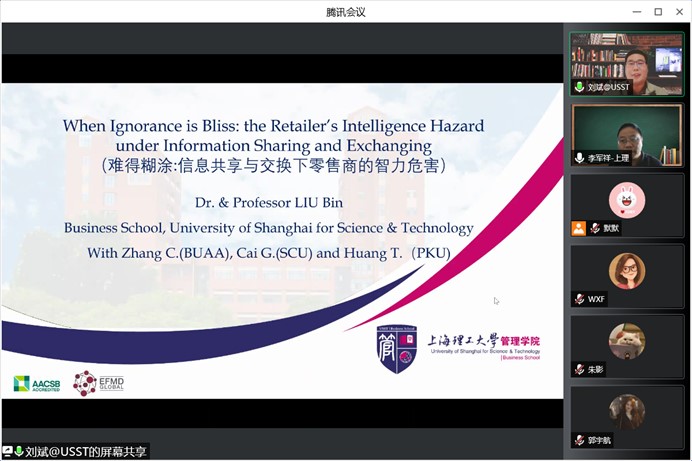On May 18, the Academic Salon of the series of activities of Hujiang economic and Management Forum of Business school (issue 26) was held at Tencent Conference (Conference No. 878-425-388). Professor Liu Bin of the Department of industrial engineering gave an academic report entitled when ignorance is bliss: the retailer's intelligence hazard under information sharing and exchange. Professor Li Junxiang of the Department of industrial engineering presided over and commented, and Guo Jinli participated in the comment.
Demand information has ubiquitously played a critical role in firms’ ordering and production planning. It is thus not uncommon for a supply chain firm to invest in demand information inference capability in industries; however, no study has explored the impact of such intelligence on supply chain firms and the entire supply chain’s efficiency. This paper investigates the impact of a retailer’s intelligence regarding the firms’ incentives in both information sharing and information exchanging in a supply chain with two competing manufacturers and a common retailer. In general, the capability of the retailer to infer the manufacturers’ demand information varies. A retailer is considered intelligent if he can infer
the manufacturers’ demand information based on the wholesale prices; otherwise, he is referred to as myopic. Our analysis first reveals that, regardless of whether the retailer is myopic or intelligent, the retailer does not want to unilaterally share his information upward with the manufacturers. Although the manufacturers can conditionally benefit from the retailer’s intelligence, the retailer faces a disadvantage for being intelligent (i.e., the retailer’s intelligence hazard) when product substitutability is low and information signal accuracy is high. We further find that a myopic retailer is willing to bilaterally exchange information with the manufacturers and the intelligence does not fully undermine the retailer’s incentives to exchange information; however, the retailer’s intelligence hazard still persists under information exchanging. We finally observe that side payment transfer may help eliminate the intelligence hazard under bilateral information exchanging, but it cannot resolve the intelligence hazard under unilateral information sharing.
After the report, the participating faculty and students discussed the topics involved in the article, and the two professors made wonderful summaries and comments on the main contributions, innovation, and future research direction of the article.

Translator: ZHOU Huijun
Reviewer: XIAO Yuewen


